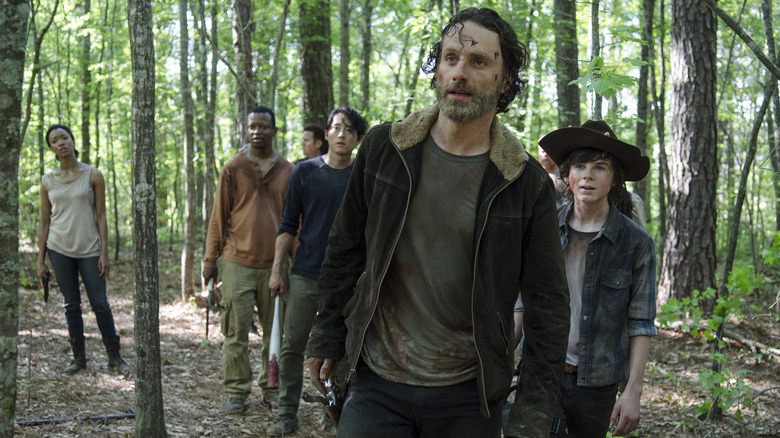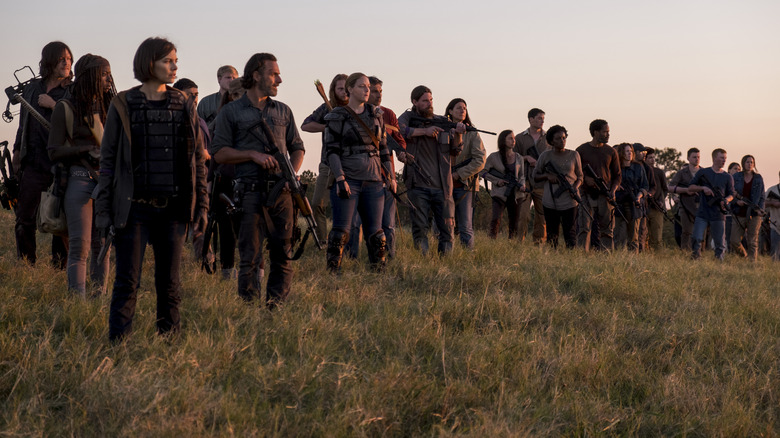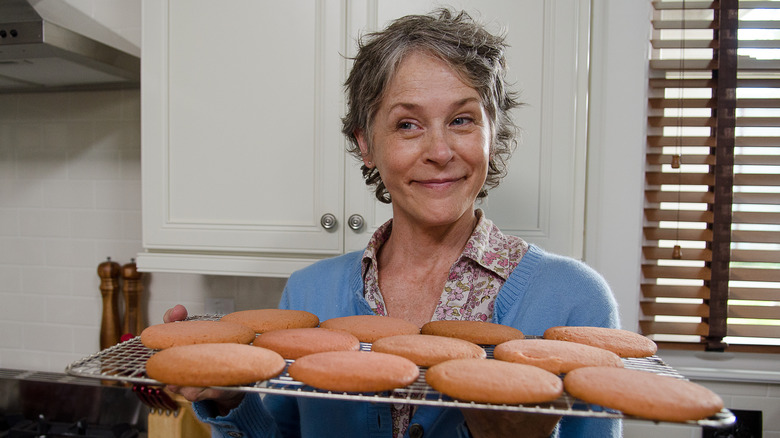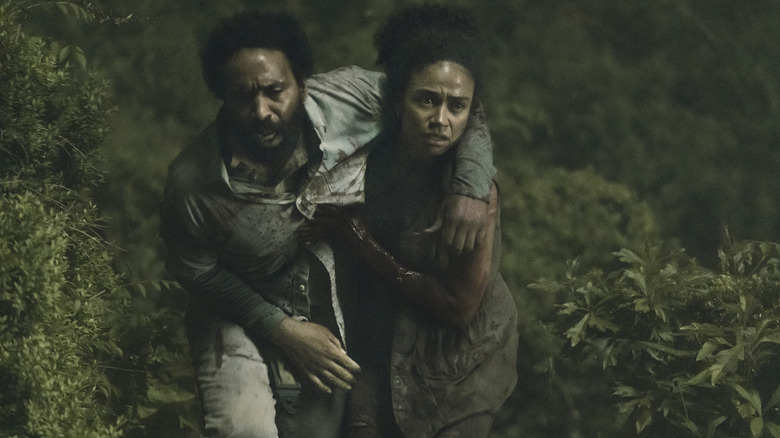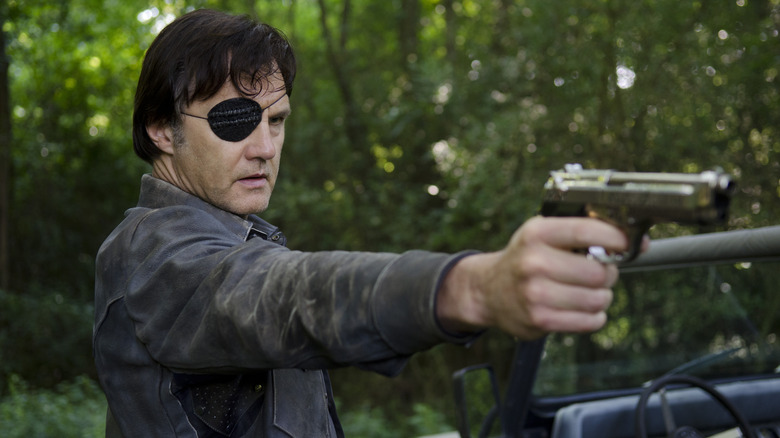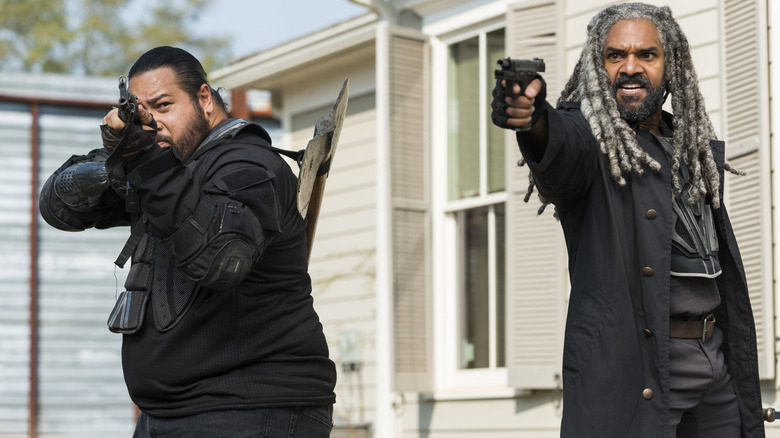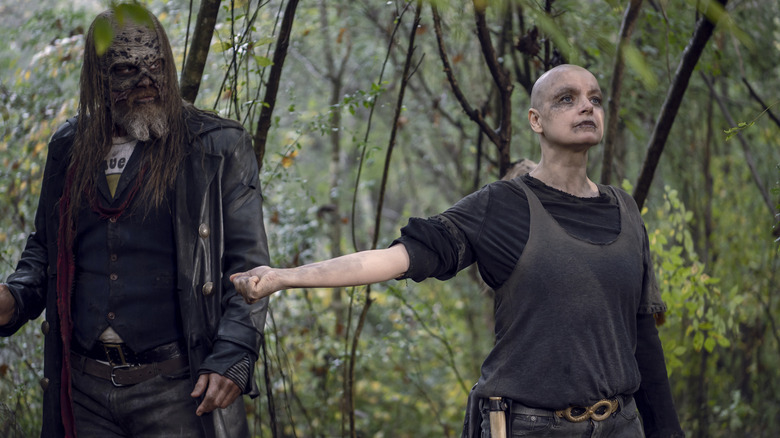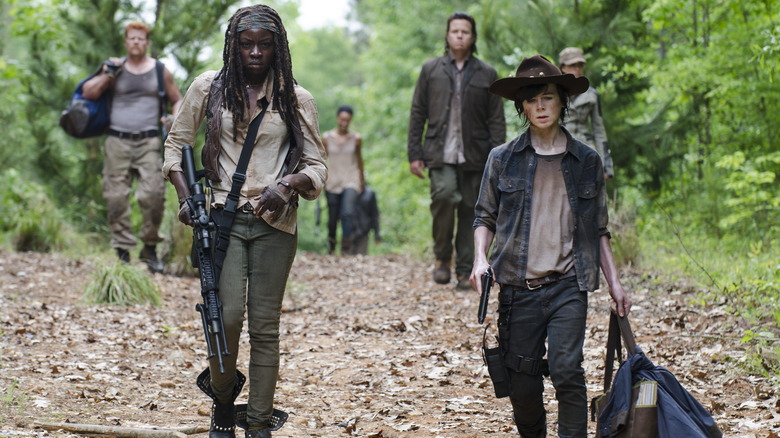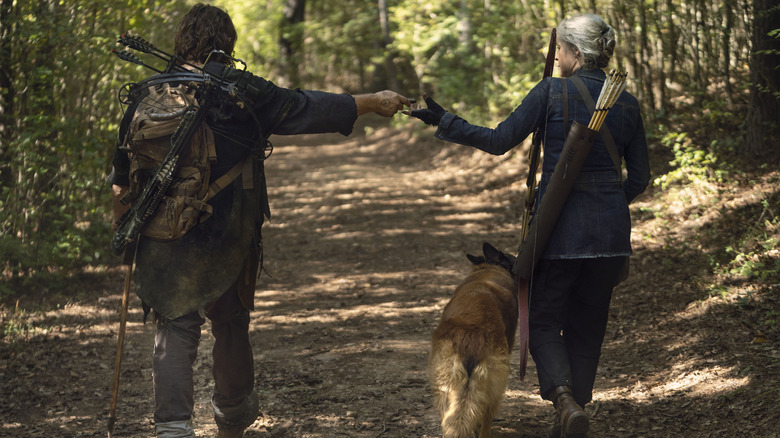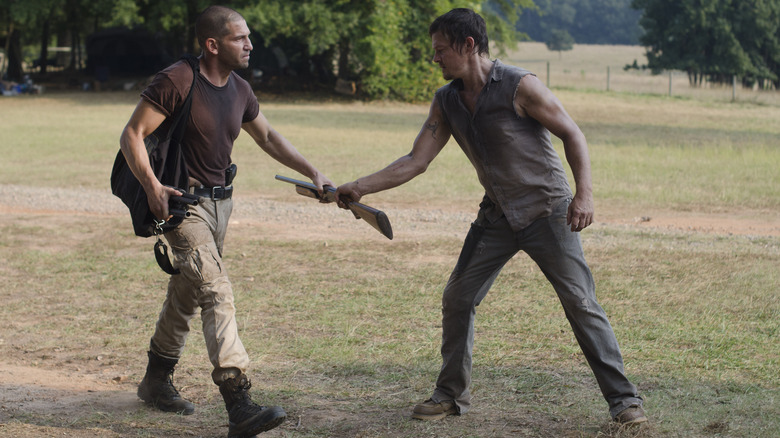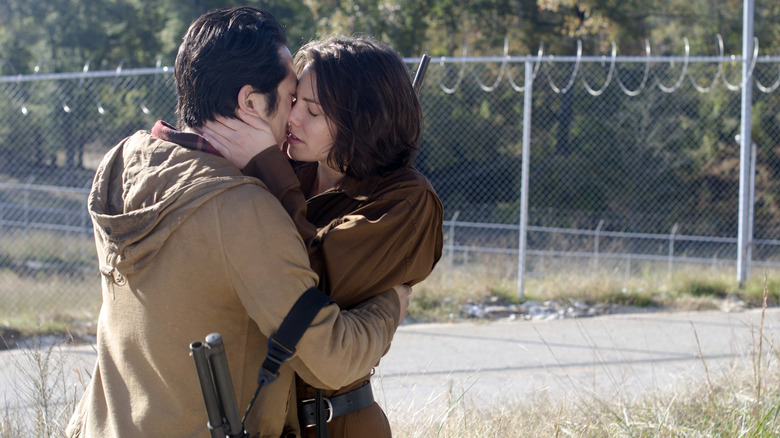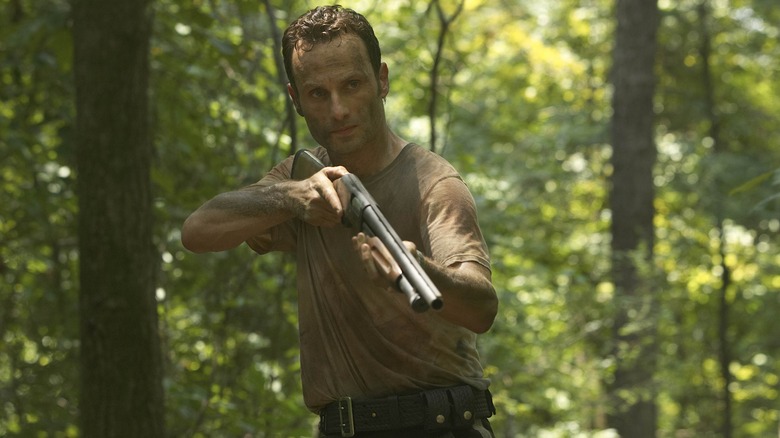Every Season Of The Walking Dead, Ranked Worst To Best
"The Walking Dead" is moving into the final stretch of its final season, ending an era. Did you make it through all 11 seasons of this wildly popular apocalypse series, or did you drop off after your favorite character got killed off or a storyline took a wacky turn? The show has had a healthy run with ups and downs.
What makes a good season of "The Walking Dead," or even just a good season of television in general? In my opinion, a good season has some kind of defining element — a character, location, or conflict — that takes up the majority of the season's story arc. In theory, since this show is based on a comic series, seasons should be pretty well-defined and follow a "volume" or story arc. That's the case with some of the best seasons of "The Walking Dead," but not all.
As we close in on the end of this show's massive run, let's take a look back, to determine which seasons worked better than others.
11. Season 8
I'll say it: the Savior War goes on way too long. Sure, it's realistic when you're in a war to feel like it's going on forever with no end in sight ... but a person watching a television show about war shouldn't feel like that, too.
Carl's death is also one of the cornier moments in the series, and word of his death spread like wildfire on social media, further convincing those who had already quit the series to stay away. I liked his YA romance storyline in Season 6 with Enid. I even liked his twisted fascination with Negan and the relationship between those two characters.
But when the show leaned really hard on Carl being a beacon of hope, innocence, and forgiveness for both Rick and Negan in his final moments, it felt like "and who has a better story than Bran"-on-"Game of Thrones"-level disingenuous.
10. Season 6
In Season 6, the show became too emotionally manipulative, attempting to trick the audience with fake-outs and teases instead of subtly subverting its expectations. Remember how they made us think Glenn was dead for weeks, removed Steven Yeun's name from the credits, and then brought him back only to kill him off a second time? This is when I almost quit the show for good, and I'm not alone. The mass exodus from the series happened around Season 6 or just after, when Negan finally showed up and killed Glenn. Negan's absence is actually one of the biggest issues with Season 6. It was a wind-up to a cliff-hanger that was ultimately more frustrating than fun.
Merritt Weaver, one of our best working actresses and, in theory, a great addition to "The Walking Dead," was also underused in the season, and her character's arc became a cause for controversy. Denise's death is often cited as an example of the "bury your gays" trope, in which a character is revealed to be LGBT and then quickly killed off, giving audiences representation on paper and not letting those characters to fully live on screen. Characters are maimed and die on "The Walking Dead" all the time, but as part of a larger cultural trend it's worth pointing out, and simply not the kind of bummer we tune in to "The Walking Dead" to see.
9. Season 11
I don't want to pass too much judgment on the current season, which will ultimately be the final season, but so far it's not my favorite. I also don't want recency bias to put it higher than it needs to be on this list. As much as I love her name, I'm not digging the developments with Daryl's ex-girlfriend and Dog's former owner, Leah and the Reapers. The Commonwealth feels a little too much like a mash-up of The Governor and the early days of the Alexandria Safe-Zone to really grab me.
I did really like the episode "On the Inside," in which Connie and Virgil become trapped in a murder house inhabited by feral human survivors. It's nice when "The Walking Dead" reminds you that it's a horror show, and Lauren Ridloff (Connie) is so good in that particular genre. With any luck, the remainder of Season 11 will give us more thrills along these lines and emotional storylines that make for a satisfying conclusion. There's still time!
8. Season 4
After some really exciting stuff in Season 3, Season 4 kind of dragged.
Sure, we were introduced to Abraham's group, as well as fan-favorite characters like Sasha and Tara. And sure, certain moments from this season stick out, like Carol's "look at the flowers" mercy kill and Beth's bond with Daryl. However, there are too many threads dangling from previous and future seasons to really allow this one to stand out. It starts off still carrying the baggage from the Governor in Season 3, and ends setting up breadcrumbs for the hospital and Terminus that are ultimately better when we get to them in Season 5. It's not the worst season, but it's not the best, either. The survivors are split into too many groups, and other seasons have handled that better.
Also, "the Claimers" has got to be the worst name for an antagonistic group in this entire series. Sorry, but it had to be said.
7. Season 7
Despite how awful Glenn's death is in the premiere, once Negan and the Saviors actually showed up on "The Walking Dead," the show started cooking again. Here we had a real nemesis for Rick Grimes and a charismatic performance from Jeffrey Dean Morgan that you love to hate ... so much so that, in later seasons, Negan has become more of a likable anti-hero more akin to someone like Loki. The world of "The Walking Dead" got much larger in Season 7, as well, with the introduction of Hilltop, Oceanside, and the Scavengers. It's actually pretty astounding that a character as dynamic as King Ezekiel was introduced this late in the game.
The main objective of this season, to raise an army and fight back against Negan and the Saviors, is relatively simple and therefore pays off. Both Eugene and Sasha have good character arcs this season. as well. It's streamlined, despite the addition of so many characters and locations.
6. Season 9
I may be in the minority here, but I liked Angela Kang's first season as showrunner a lot. You wouldn't think that something as simple as a couple of time jumps would refresh a television show so much, but it really worked! It was also probably the best way to rip the band-aid off and remove Rick Grimes from the series without grinding all of the drama to a halt. By jumping ahead six years, we skip past the majority of the group's grief over Rick's disappearance (Remember, we know he's alive... but his family of survivors still don't). There was mystery and intrigue about what happened during those intervening months and years to keep up the interpersonal drama. Lydia was a very good addition to the series, as well.
Speaking of Lydia ... then came The Whisperers. How do you introduce a new Big Bad to rival the Governor and Negan? First, cast Samantha Morton as Alpha. Second, have her and her people stage a massacre bigger and scarier than they've ever seen before. Just when you think "The Walking Dead" can't think of new ways to spook the audience, the group finds 10 decapitated heads on a hill. If you quit the show when Andrew Lincoln left, I suggest going back. This season and the next one are pretty great.
5. Season 5
Between Grady Memorial Hospital, the cannibals at Terminus, Morgan's return (again), and the introduction of the Alexandria Safe-Zone, this season is one of the more varied in the whole series — and therefore one of the most memorable and enjoyable. It also had one heck of a finale, with all of those storylines converging.
This season tested Rick's group, putting them in dangerous environments where they were antagonized and (relatively) innocent environments where they were seen as antagonists. Not all of them adjusted to the Alexandria Safe-Zone well. They clashed with some of the survivors who haven't had it quite as hard as them. If they were to seize control of the community in a coup d'etat, would that make them any better than the villains at Terminus, or the Governor? It made the final image of the season, in which Morgan reaches Alexandria and sees Rick covered in blood after executing a man in cold blood, all the more powerful. One man's hope is another man's nightmare.
4. Season 10
This season was supersized (and spread out over three years due to the Covid-19 pandemic shutting down production), but what we ended up getting in the second half of the season was a lot of episodes that do something "The Walking Dead" does better than any other season: Isolated character-driven episodes with just two or three people.
Typically we get just one or two of these per season, and those episodes tend to involve Morgan Jones. But Season 10 used pandemic restrictions to their creative advantage. Father Gabriel and Aaron teamed up for an episode, and met an unhinged character played by guest star Robert Patrick. Daryl and Carol had a heart-breaking episode all about their friendship. The finale centered on Negan in exile — and his past with his wife, Lucille, played in flashbacks by Morgan's wife Hilarie Burton.
Maggie also came back in the second half of this season, though only briefly. Her return to a community where Negan is more or less an ally is a thread the final season will have to resolve. The first half of the season is good, too, don't get me wrong: It wraps up the Whisper War more succinctly than the show did with The Saviors and, without Rick, allows characters like Carol, Michonne, Aaron, and Daryl to step up.
3. Season 2
Most folks got hooked on the show in its second season. This is the season that introduced us to Maggie, Beth, and Hershel Greene. It's where Maggie and Glenn's epic romance began and grew. We lost huge characters like Dale and Sophia. It's also the season where Jon Bernthal's Shane really popped as both a character and a complicated villain; the notion that "Shane was right," philosophically speaking, about how to survive in a zombie apocalypse persists even to this day. The show has introduced many "Big Bads" over the years, both from the comics and original creations from the writer's room, but it's hard to beat friends turning on each other like Rick and Shane.
For all its faults, the situation on the farm is kind of what our group of survivors on "The Walking Dead" has been striving for ever since. Any community they try to create, be it at the prison, Alexandria, Hilltop, or even on the road, is modeled after the relative safety and intimacy they briefly found at Hershel's farm.
2. Season 3
Three things push Season 3 to the top of the list: The pop culture game-changing introduction of Danai Gurira as Michonne, the creepy and complicated dictatorship led by The Governor, and the surprising return of Merle Dixon. It was a great arc from start to finish and probably the most "solid" season overall, story-wise and character-wise. Season 3's stand-alone episode, "Clear," which marked Morgan Jones' first return since Season 1, remains one of the best episodes of the series.
It also marked one of the biggest departures from the comics: Andrea's death. Killing off Andrea was a true shock, and a creative challenge for the remainder of the series as her storylines shifted to other characters. "The Walking Dead" has managed to run parallel to its source material in a really interesting way. Pretty much every storyline and character has made the transition from the page to the screen, and the series has never swerved so far off course that it has become its own thing (that's what the spin-offs are for), but the show is never predictable, either. Season 3 exemplifies this better than almost any other season.
1. Season 1
At the end of the day, it's hard to beat the iconic first season. It's only six episodes long (shockingly short by American television standards), but was absolutely instrumental in bringing genre and populism to Prestige TV and bringing new life to the zombie/post-apocalyptic fad in pop culture.
"The Walking Dead" pilot remains one of the best pilots of all time. The CDC storyline has become more relevant than ever after a couple of years in a global pandemic, but what sets the season and the show apart is the strength of the characters. You remember how you first met Rick Grimes. You remember how Rick first met Glenn. You remember the drama between Rick, Shane, and Lori that somehow seemed higher stakes than the apocalypse itself. While so few characters from Season 1 remain part of the franchise (Carol, Daryl, Morgan, and technically Rick since he's still alive out there, somewhere), the ones we started out with laid the foundation for years to come.
